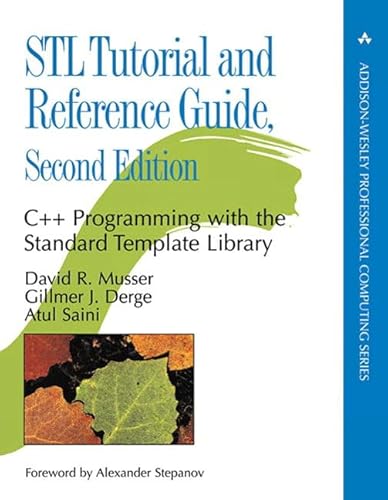STL Tutorial and Reference Guide: C++ Programming with the Standard Template Library (paperback) (Addison-Wesley Professional Computing Series) - Softcover

Synopsis
"The second edition is clearer and adds more examples on how to use STL in a practical environment. Moreover, it is more concerned with performance and tools for its measurement. Both changes are very welcome."
--Lawrence Rauchwerger, Texas A&M University
"So many algorithms, so little time! The generic algorithms chapter with so many more examples than in the previous edition is delightful! The examples work cumulatively to give a sense of comfortable competence with the algorithms, containers, and iterators used."
--Max A. Lebow, Software Engineer, Unisys Corporation
The STL Tutorial and Reference Guide is highly acclaimed as the most accessible, comprehensive, and practical introduction to the Standard Template Library (STL). Encompassing a set of C++ generic data structures and algorithms, STL provides reusable, interchangeable components adaptable to many different uses without sacrificing efficiency. Written by authors who have been instrumental in the creation and practical application of STL, STL Tutorial and Reference Guide, Second Edition includes a tutorial, a thorough description of each element of the library, numerous sample applications, and a comprehensive reference.
You will find in-depth explanations of iterators, generic algorithms, containers, function objects, and much more. Several larger, non-trivial applications demonstrate how to put STL's power and flexibility to work. This book will also show you how to integrate STL with object-oriented programming techniques. In addition, the comprehensive and detailed STL reference guide will be a constant and convenient companion as you learn to work with the library.
This second edition is fully updated to reflect all of the changes made to STL for the final ANSI/ISO C++ language standard. It has been expanded with new chapters and appendices. Many new code examples throughout the book illustrate individual concepts and techniques, while larger sample programs demonstrate the use of the STL in real-world C++ software development. An accompanying Web site, including source code and examples referenced in the text, can be found at http://www.cs.rpi.edu/~musser/stl-book/index.html.
"synopsis" may belong to another edition of this title.
About the Author
David R. Musser, currently of Rensselaer Polytechnic Institute, has been involved with STL almost from its inception. Collaborating with its creator, Alexander Stepanov, he helped develop the first implementation and contributed to STL's inclusion in the ANSI/ISO C++ standard.
Atul Saini is President and CEO of Modena Software Incorporated, which distributes STL++, the first commercial STL product.
From the Back Cover
"The second edition is clearer and adds more examples on how to use STL in a practical environment. Moreover, it is more concerned with performance and tools for its measurement. Both changes are very welcome."
--Lawrence Rauchwerger, Texas A&M University
"So many algorithms, so little time! The generic algorithms chapter with so many more examples than in the previous edition is delightful! The examples work cumulatively to give a sense of comfortable competence with the algorithms, containers, and iterators used."
--Max A. Lebow, Software Engineer, Unisys Corporation
The STL Tutorial and Reference Guide is highly acclaimed as the most accessible, comprehensive, and practical introduction to the Standard Template Library (STL). Encompassing a set of C++ generic data structures and algorithms, STL provides reusable, interchangeable components adaptable to many different uses without sacrificing efficiency. Written by authors who have been instrumental in the creation and practical application of STL, STL Tutorial and Reference Guide, Second Edition includes a tutorial, a thorough description of each element of the library, numerous sample applications, and a comprehensive reference.
You will find in-depth explanations of iterators, generic algorithms, containers, function objects, and much more. Several larger, non-trivial applications demonstrate how to put STL's power and flexibility to work. This book will also show you how to integrate STL with object-oriented programming techniques. In addition, the comprehensive and detailed STL reference guide will be a constant and convenient companion as you learn to work with the library.
This second edition is fully updated to reflect all of the changes made to STL for the final ANSI/ISO C++ language standard. It has been expanded with new chapters and appendices. Many new code examples throughout the book illustrate individual concepts and techniques, while larger sample programs demonstrate the use of the STL in real-world C++ software development. An accompanying Web site, including source code and examples referenced in the text, can be found at http://www.cs.rpi.edu/~musser/stl-book/index.html.
"About this title" may belong to another edition of this title.
Search results for STL Tutorial and Reference Guide: C++ Programming with...
STL Tutorial and Reference Guide: C++ Programming with the Standard Template Library (paperback) (Addison-Wesley Professional Computing Series)
Seller: HPB-Red, Dallas, TX, U.S.A.
paperback. Condition: Good. Connecting readers with great books since 1972! Used textbooks may not include companion materials such as access codes, etc. May have some wear or writing/highlighting. We ship orders daily and Customer Service is our top priority! Seller Inventory # S_430271731
STL Tutorial and Reference Guide: C++ Programming with the Standard Template Library (paperback) (Addison-Wesley Professional Computing Series)
Seller: Toscana Books, AUSTIN, TX, U.S.A.
Paperback. Condition: new. Excellent Condition.Excels in customer satisfaction, prompt replies, and quality checks. Seller Inventory # Scanned0321702123
